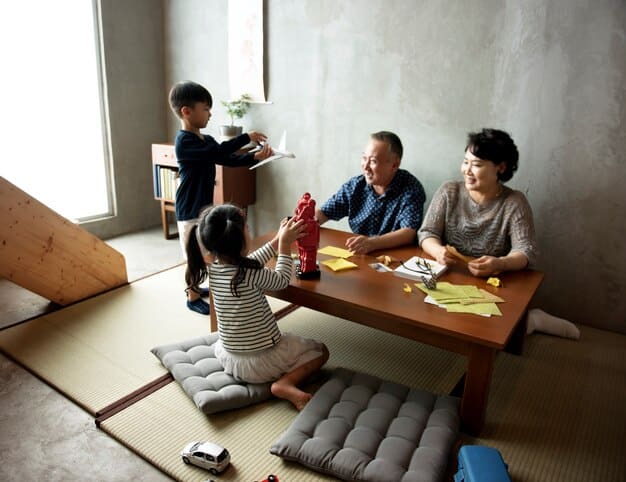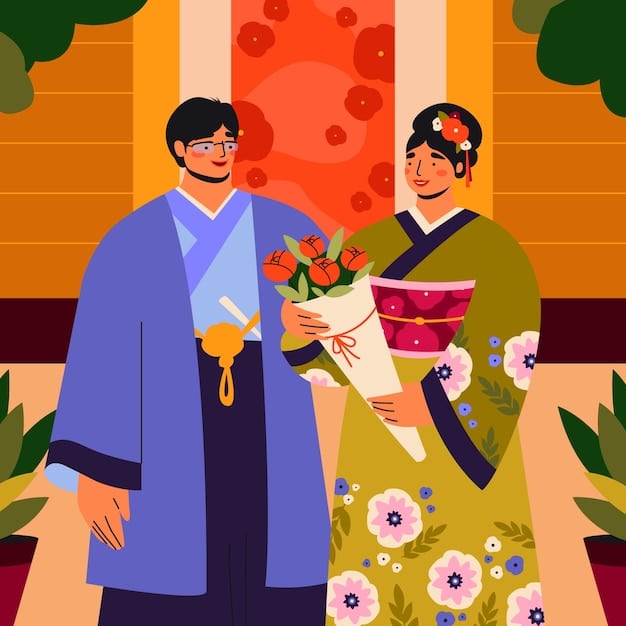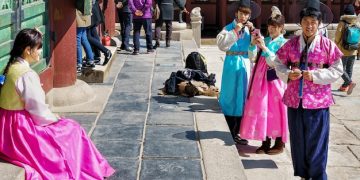Understanding Korean Family Dynamics: A Guide for Americans in 2025

Understanding Korean Family Dynamics in 2025 is crucial for Americans interacting with Korean individuals, focusing on respecting familial hierarchy, appreciating collectivism over individualism, and navigating communication nuances for harmonious relationships.
Navigating the intricate web of family relationships is key when engaging with Korean culture. As we approach 2025, understanding Korean family dynamics: a guide for Americans in 2025 becomes increasingly vital for fostering successful personal and professional connections.
The Foundation of Korean Society: Understanding Family
The concept of family in Korea goes far beyond the nuclear unit. It’s a foundational pillar shaping social interactions, personal identity, and cultural values. Understanding this framework is essential for Americans seeking to build meaningful relationships in Korea.
Korean family dynamics are deeply rooted in Confucianism, which emphasizes filial piety (hyo), respect for elders, and the importance of maintaining harmony within the family unit. These principles influence everything from daily interactions to major life decisions.

Filial Piety (Hyo): The Cornerstone of Respect
Filial piety, or *hyo*, is the driving force of Korean family life. It dictates that children have a lifelong duty to respect, care for, and obey their parents. This isn’t just a suggestion; it’s a deeply ingrained cultural norm.
- Respect for Elders: Age is revered in Korean society. Elders are seen as sources of wisdom and guidance, deserving of the utmost respect.
- Obligation to Care: Children are expected to support their parents financially and emotionally as they age, often living with them or providing nearby care.
- Maintaining Family Honor: Actions of individual family members reflect on the entire family. Avoiding shame and upholding the family’s reputation is paramount.
Understanding and appreciating the concept of *hyo* will help you build rapport with Korean individuals and demonstrate your respect for their culture. It signifies that you recognize the importance of family values in their lives.
Hierarchy and Roles within the Korean Family
Korean families are typically structured around a hierarchical system, with clear roles and responsibilities for each member. This structure is vital for maintaining order and harmony. Understanding these roles will help Americans navigate family interactions with sensitivity.
The eldest male, usually the grandfather or father, generally holds the position of authority. His decisions often carry significant weight, and his opinions are highly valued. Younger members are expected to defer to his judgment.

The Role of the Eldest Son and Other Family Members
Traditionally, the eldest son carries significant responsibilities within the family. He is often expected to take care of his parents in their old age and continue the family lineage. While these roles are evolving in modern Korea, they still hold cultural significance.
- Eldest Son’s Responsibilities: The eldest son traditionally inherits the family home, ancestral land, and the responsibility of caring for his parents.
- Daughters’ Roles: While daughters were traditionally expected to marry out of the family, they now often play a greater role in supporting their parents.
- The Importance of Marriage: Marriage is considered a significant milestone in Korean culture, reinforcing family ties and continuing the lineage.
Acknowledging these hierarchical roles and showing respect for elders will demonstrate cultural sensitivity and build trust with Korean families. It’s about recognizing the significance of each member’s position within the family structure.
Collectivism vs. Individualism: A Key Cultural Difference
One of the most significant differences between American and Korean cultures lies in the emphasis on collectivism versus individualism. Understanding this distinction is essential for avoiding misunderstandings and building strong relationships.
While American culture tends to prioritize individual needs and goals, Korean culture emphasizes the importance of the group, particularly the family. Decisions are often made with the family’s well-being in mind, rather than individual desires.
Group Harmony and Family Needs
In Korea, maintaining group harmony is paramount. Individuals often suppress their personal desires to avoid conflict or embarrassment to the family. This emphasis on collectivism can influence various aspects of life, from career choices to social interactions.
This collectivist mindset shapes how Koreans approach relationships, decision-making, and communication. It’s important to be mindful of this cultural difference when interacting with Korean individuals and families.
For Americans, this might mean adjusting their communication style to be more indirect and considerate of others’ feelings. It also involves understanding that decisions may be influenced by family needs rather than individual preferences.
Communication Styles and Etiquette in Korean Families
Effective communication goes beyond language; it encompasses understanding cultural nuances and social cues. In Korean families, communication is often indirect and context-dependent. Learning these nuances is crucial for effective interaction.
Direct confrontation is generally avoided in Korean culture, especially within the family. Instead, communication often relies on subtle cues, body language, and understanding the context of the situation.
Respectful Language and Non-Verbal Cues
Using respectful language (honorifics) is essential when addressing elders or individuals in a position of authority. Maintaining eye contact, bowing slightly, and using appropriate titles are also crucial aspects of Korean etiquette.
- Honorifics: Use appropriate honorific titles when addressing elders or superiors to show respect.
- Body Language: Be mindful of your body language. Avoid overly assertive gestures or direct eye contact, which may be perceived as confrontational.
- Indirect Communication: Pay attention to subtle cues and unspoken messages. Koreans may avoid directly saying “no” to avoid causing discomfort.
Mastering these communication nuances will help you navigate interactions with Korean families more smoothly and demonstrate your respect for their culture and traditions. It’s about showing that you understand and value their way of communicating.
Navigating Gift-Giving and Hospitality
Gift-giving is an integral part of Korean culture, especially within families. Understanding the etiquette surrounding gift-giving and receiving hospitality is essential for showing respect and appreciation.
Gifts are often exchanged on special occasions such as birthdays, holidays, and weddings. The type of gift, the way it’s presented, and the recipient’s reaction all carry cultural significance.
Choosing the Right Gift and Expressing Gratitude
When selecting a gift for a Korean family, consider the occasion and the recipient’s preferences. Practical gifts, such as food or household items, are often appreciated. Always present gifts with both hands and express sincere gratitude when receiving one.
- Appropriate Gifts: Consider the recipient’s age, status, and preferences when choosing a gift. Avoid overly expensive or extravagant gifts, which may cause discomfort.
- Presentation Matters: Wrap gifts neatly and present them with both hands as a sign of respect.
- Expressing Gratitude: Always express sincere gratitude when receiving a gift. A simple “thank you” is often sufficient.
Mastering the art of gift-giving and expressing gratitude will allow you to demonstrate your appreciation for Korean hospitality and strengthen your relationship with Korean families. It showcases that you understand their cultural customs.
Evolving Family Dynamics in Modern Korea
While traditional family values remain important, Korean family dynamics are evolving in response to globalization, urbanization, and changing social norms. Understanding these shifts is crucial for a nuanced perspective.
Modern Korean families are becoming smaller, with fewer children and a greater emphasis on individual pursuits. Traditional gender roles are also evolving, with women increasingly pursuing careers and challenging societal expectations.
Balancing Tradition and Modernity
Despite these changes, the core values of filial piety, respect for elders, and family harmony remain deeply ingrained in Korean society. Many families strive to balance traditional customs with modern lifestyles.
It’s important to be aware of these evolving dynamics when interacting with Korean families. Avoid making assumptions about their values or expectations based solely on traditional stereotypes. Individual families may have different approaches to balancing tradition and modernity.
Remember that families might have their own unique ways of navigating these changes. Being open-minded and adaptive will help you build genuine connections.
| Key Aspect | Brief Description |
|---|---|
| 👨👩👧👦 Family Importance | Family is central, influencing decisions and identity. |
| 👵 Respect for Elders | Elders are revered, with strong expectations of filial piety. |
| 🤝 Collectivism | Group harmony is prioritized over individual desires. |
| 🗣️ Communication | Indirect and context-dependent, emphasizing respect and avoiding confrontation. |
Frequently Asked Questions
▼
‘Hyo’ refers to filial piety, the duty of children to respect, care for, and obey their parents. It’s a core value shaping family dynamics.
▼
Decisions are often influenced by the family’s well-being and the opinions of elders, reflecting a collectivist approach.
▼
Use honorifics, bow slightly, offer help, and listen attentively to show your respect and consideration for their wisdom.
▼
Yes, women are increasingly pursuing careers, and traditional roles are evolving, though core values remain important.
▼
Choose practical gifts, present them with both hands, and express sincere gratitude to show respect and appreciation.
Conclusion
As Americans navigate relationships with Korean individuals and families in 2025, understanding the nuances of Korean family dynamics is paramount. By embracing cultural sensitivity, respecting hierarchical structures, and valuing collectivism, you can foster stronger connections and build successful, harmonious relationships within the Korean community.





